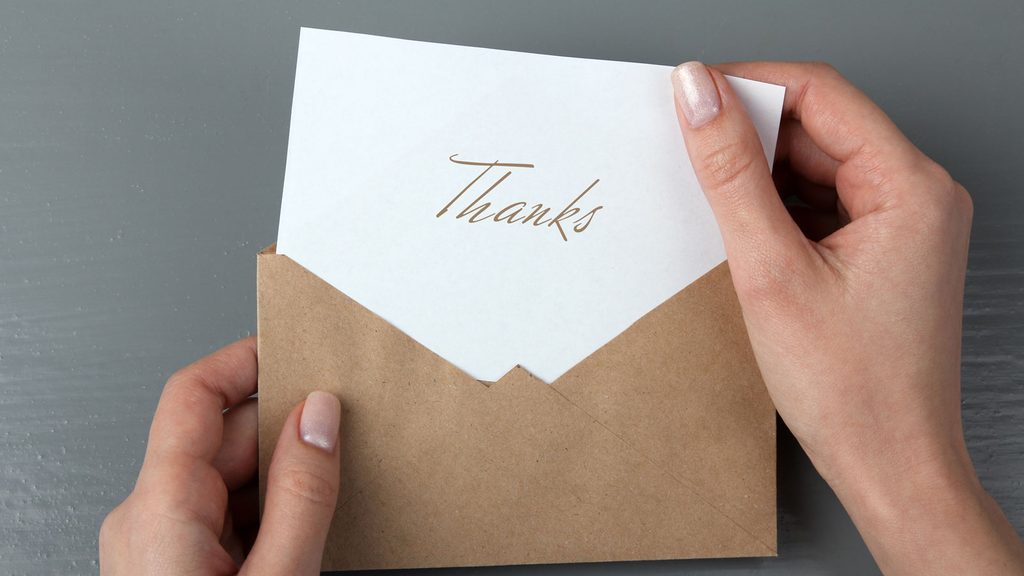8 Times You Should Send a Thank-You Letter

Have you received a gift? Attended a dinner party? Have someone checking up on you? Go on and send a thank-you note—it's good for you.
According to Emilie Dulles, who has more than 29 years of experience in traditional etiquette, people should be sending more thank-you letters than ever before. Sending thank-you notes not only is an important social norm but also can have a positive impact on your health. Practicing gratitude has been scientifically proven to make you happier and can even improve your health, as per Harvard Health Publishing.
So, here are eight occasions in which you definitely need to send one. And down below, tips on how to write one.
When should you send a thank-you letter?
1. After a job interview
This should go without saying, but you should absolutely be sending a thank-you letter after a job interview—if you want an offer. Bonnie Tsai, the founder and director of Beyond Etiquette, says it’s important to express your gratitude towards your interviewer regardless of whether or not you landed the job since they made time in their busy schedule to meet with you.
2. After receiving gifts
No matter the occasion, you should send thank-you letters after receiving gifts for a birthday, wedding, graduation, or a holiday like Christmas, according to Tsai. “They took the time to find a gift that they believe you will enjoy, therefore it’s important to let them know how much you appreciate their effort and present,” Tsai says. Dulles adds that it’s a good idea to specifically mention the gift in your letter and include a message about how much you like the item.
3. After someone writes a letter of recommendation
If your professor or boss writes a letter of recommendation for you or helped you with an interview, a thank-you letter is a good way to acknowledge your appreciation for their effort and support, Dulles says. The benefits of gratitude and counting your blessings last long after sending this letter.
4. After receiving condolence notes or gifts
Tsai says it’s important to send a letter to everyone who gives flowers, donations, or notes. It’s perfectly acceptable for a close friend or relative to write the letters during this difficult time.
5. After being a houseguest
If you’ve ever hosted friends or family from out of town, you know how hard it is to prep and host even those you love most. So take the time to write a thank-you letter when you are a guest at their place. Again, your host or hostess made an effort to prepare their home for your stay, so it’s good to recognize their generosity, Tsai says.
6. After a dinner party
Hosting a dinner party takes lots of planning, preparation, and effort. Sending a thank-you letter is a nice reminder for the host that the dinner party was fun and you appreciate their hosting and planning skills, according to Tsai.
7. After someone does you a favour
Thank-you letters aren’t just for special occasions or big gifts. Show that you recognize the little things with a handwritten note. Thank-you letters after an act of kindness, generosity, or favour are always a good idea, Dulles says. “For example, if your neighbours water your plants while you are on vacation, a thank-you letter should be sent to recognize the time it took them to help,” Dulles says.
8. After a major life change
You should send a thank-you letter if you are going through a major life change such as a divorce, graduation, wedding, or promotion. People forget to send thank-you letters while going through changes because of extra responsibilities and obligations. It’s during those seasons of change, however, that family, friends, and colleagues step up through acts of kindness. Writing thank-you letters recognizes their support and is a therapeutic way to acknowledge the encouragement from others, according to Dulles. (Find that you put lot of energy into caring for others? Here are 10 ways to show yourself some love.)
How to write a thank-you letter
Thank-you letters don’t have to be overly long or complicated, Dulles says. They should be personal and heartfelt according to the occasion and recipient. Here’s how to get started.
Step 1: Address the recipient based on your relationship
Address friends and family by their first names, but use Mr. or Mrs. for an interviewer or potential employer, Tsai says
Step 2: Acknowledge what you are thanking them for
This line should be a specific reference to the gift since it’s the main subject of the letter.
Step 3: Mention how you plan to use or display the gift
This is your chance to explain how the item is meaningful.
Step 4: Close the letter with warm words about the person
The end of the letter is your chance to add more personal elements and warm words about the gift giver, specifically. Tsai recommends referencing something in the future with them involved. For example, “I look forward to having you over for dinner after we are back from our honeymoon.”
When shouldn’t you send a thank-you letter?
If you’re questioning whether or not to send a thank-you letter, consider this: Thank-you letters might have been the norm a couple of decades ago, but nowadays they are a secret weapon for a person who wants to be remembered, supported, and favoured, Dulles says. They show that you recognize, care, and appreciate them. It’s never a bad idea to give someone that simple acknowledgment.
Next, check out these insightful prompts for your gratitude journal.




